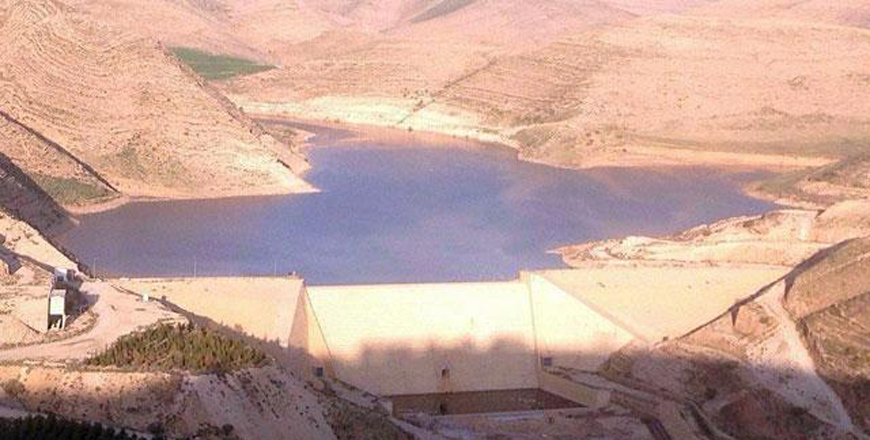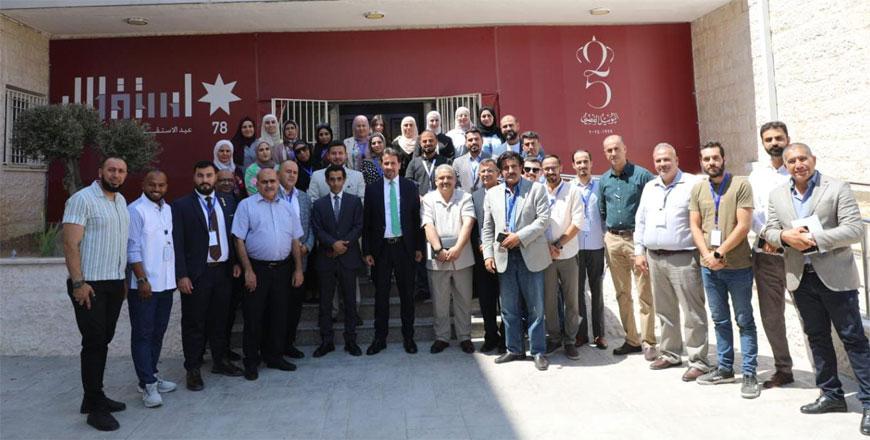You are here
5-million-euro agreement signed to initiate rainwater harvesting project in Kingdom
By JT - Dec 12,2021 - Last updated at Dec 12,2021

Dutch Ambassador Harry Verweij and Executive Director of INWRDAM Marwan Al Raggad sign an agreement on Sunday (Photo courtesy of the Dutch embassy)
AMMAN — The Embassy of the Kingdom of the Netherlands on Sunday signed a 5-million-euro partnership with the Inter Islamic Network on Water Resources Development and Management (INWRDAM) for the design and implementation of a three-year project on rainwater harvesting.
Dutch Ambassador Harry Verweij, Secretary General of the Ministry of Water and Irrigation Jihad Al Mahameed, Secretary General of the Jordan Valley Authority Manar Al Mahasneh and representatives of the implementing partners, Ministry of Agriculture, Ministry of Environment and the local governments of Azraq, Mafraq and the North Jordan Valley attended the signing ceremony, according to an embassy statement.
The project will be implemented by INWRDAM, IHE Delft and Acacia Water in close partnership with the Ministry of Water and Irrigation and the Jordan Valley Authority.
As the second most water-stressed country in the world, Jordan relies on groundwater for its primary source of water supply. This makes aquifer management a matter of national security and concern, read the statement.
Overexploitation of groundwater resources across the country accelerated by climate change has led to severe ecosystem degradation.
In addition to that, urbanisation and population growth have placed additional strains on dwindling groundwater resources. Therefore, this project aims to integrate water harvesting as an integral water management and climate adaptation intervention in Jordan’s resiliency efforts, the statement said.
“Integrated water resources management is crucial to Jordan’s resilience in the face of climate change and depleting groundwater. Unconventional water resources such as rainwater harvesting is crucial to alleviate the pressure on existing water resources,” Verweij during his opening remarks at the project signing ceremony.
“This project is a true Dutch-Jordanian partnership involving government, academia, non-governmental organisations and the private sector from both our countries, and we have no doubt that it will bare fruitful results,” the ambassador added.
A Climate Change Vulnerability Assessment (CCVA) was conducted to identify locations most susceptible to the negative effects of climate change and other stressors such as severe groundwater depletion and large population strain. This resulted in the identification of Azraq, Mafraq and the North Jordan Valley as the three priority locations.
“The substantial environmental benefits associated with implementing rainwater harvesting techniques on catchment scale are encouraging factors for further investment in scaling-up these techniques in Jordan. Scaling-up can only be successful when rainwater harvesting techniques are included in plans for integrated land and water resources development which factor all the necessary technical, environmental, socioeconomic and institutional elements,” said Mahameed.
Executive Director of INWRDAM Marwan Al Raggad said: “The climate change in Jordan is clearly making rain more intense with shorter duration creating high risk of floods and causing loss of precious fresh water. We need to adopt the 3Rs (Recharge, Retention and Reuse) to combat the climate change impact and to economically empower local communities through water harvesting”.
The project consists of four lead components:
— Initiation of national rainwater harvesting policy dialogue with the aim of creating relevant legislation and regulation.
— Establishment of rainwater harvesting sites, smart farms and monitoring practices.
— Capacity building of MWI staff, local communities and other key stakeholders on knowledge and skills around rainwater harvesting and managed aquifer recharge practices.
— Promotion of the key learnings and success stories gained from the rainwater harvesting interventions.
This project is aligned with national and local policy on water management and will provide innovative design tools to allow for water harvesting practices in Jordan to continue to improve and adapt to changing climatic parameters.
In addition, local communities in the three areas will be able to benefit from the project and home-based businesses (HBBs) that will be irrigated with harvested water and powered by solar energy, constituting a primary example of the water, energy and food nexus.
During this signing ceremony, a second initiative was launched with Wageningen University under the title “Policy Dialogue on Productive Water Use in Jordan”.
Supported by the Embassy of the Kingdom of the Netherlands, this short-term initiative aims to bring people from various water use sectors together to discuss and propose alternate ways to reduce water use in light of the water scarcity Jordan is facing.
Related Articles
AMMAN — Jordan grapples with water scarcity, which is interconnected between rainfall and groundwater levels.
AMMAN — The National Agricultural Research Centre (NARC) on Monday launched an initiative to develop the Jordanian water harvesting strategy
AMMAN — The recent rainfall has increased water reserves in sand dams and rainwater harvesting wells to 70 per cent, Minister of Agriculture













